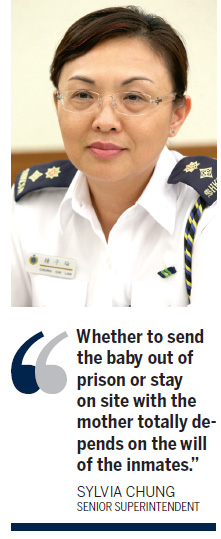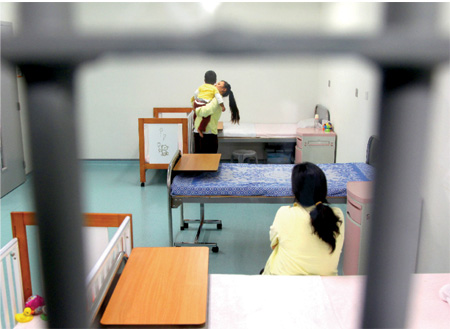Children in prison
Updated: 2011-01-12 06:57
By Michelle Fei(HK Edition)
|
|||||||||
|
Cindy, an Indonesian prisoner, carries her son in a cell at Lo Wu Correctional Institution. Edmond Tang / China Daily |
In Hong Kong's Lo Wu Correctional Institution, nine young mothers are taking care of small children. It's a sad way for a child to begin life but for some there is no alternative. Michelle Fei reports.
What would it be like to give birth to a child then care for it in prison? For 25-year-old Xiao Dan, the idea was unimaginable but last year, it became the reality she faced.
Wearing a yellow-colored prison uniform, the young woman looks just like any other inmate. But her round eyes and face make her look younger, more childish than her fellow prisoners. Her distended stomach identified her as an expectant mother, in her ninth month of pregnancy.
"I was not in a panic. Once I heard my sentence, I knew this (giving birth in prison) is what was going to happen," she told China Daily as she recalled her feelings while standing before a judge six months earlier, in July.
Her features took on a more mature look when she talked about her baby.

Xiao Dan, a Hainan citizen, had been running small advertising business with her husband in Guangzhou before her imprisonment. She was arrested at Shenzhen Bay Customs check point in July 2010 for conducting a marriage of convenience with a Hongkonger.
Her motivation, as she stated, was to obtain a Hong Kong identity to take advantage of the vibrant economic environment in the SAR. For that she was sentenced to eight months in jail.
Xiao Dan was transferred to Lo Wu Correctional Institution in August, where the baby is expected to be born in February, a month before her discharge.
However, the identity of the baby caught the young mother in a dilemma.
On one hand, her daughter, who will be born in prison, will become a permanent Hong Kong resident the day she is born.
On the other hand, to ensure a healthy childhood, Xiao Dan wants to erase any evidence that her daughter was born in a Hong Kong prison. She smiled bitterly as she reflected on how her "Hong Kong dream" of having children here mocked her.
"I will give up the Hong Kong identity of my baby and take her back to the mainland for education," she said quietly. Her tone was steady yet the decision clearly was not an easy one.
She told China Daily that she planned to go back to reunite with her husband in Guangzhou and have the baby grow up with her grandmother in their hometown of Hainan.
A spokesman for Hong Kong Immigration Department told China Daily that since Xiao Dan's case would be the first in which the Hong Kong identity for a new born baby was repudiated, the government has no guidelines at the moment. Yet he added the crux of the "pioneering" action would be whether the baby can be given a household registration on the mainland.
Following a settled timetable and taking some light work in the prison factory, Xiao Dan lives a rather regular life in Lo Wu Correctional Institution. Every month, she is sent to Queen Elizabeth Hospital for a heath check. Everyday she gets an extra egg.
There are nine mothers with children in Lo Wu Correctional Institution. The institution just reopened in July 2010. It houses 1,200 female inmates; 561 of them are mainlanders.
All inmates shared equal rights to "full-time" care of their new born babies in prison, if they choose to, according to Senior Superintendent Sylvia Chung.
"Whether to send the baby out of prison or stay on site with the mother totally depends on the will of the inmates. If there's no better care available outside the prison, then staying with the mother was definitely a better choice for the baby," said Madam Chung.
The institution includes an outpatient clinic fully capable of providing maternity services and located next door is a parent-child center where newborns can stay on site until they reach the age of three.
Being separated by steel bars, Xiao Dan can meet her husband and mother twice a month, half an hour each time.
A prenatal education program broadcast on Shenzhen 91 PM radio from 8 pm to 8:30 pm every night was Xiao Dan's only prenatal education.
"I wish her grow up to be a good person, an independent girl," said Xiao Dan. Her wish is simple and earnest. She whispers the family's names and her wishes to the baby during quiet nights.
Alvino, a 15-month-old boy, spends his playtime in the parent-child center. It's his playground and his only access to toys and books since he was born at the prison in 2009. He is allowed to spend one hour there every day from 3 pm to 4 pm.
His mother, Cindy, a 27-year-old Indonesian jailed for possessing illicit drugs, found a new way of life when he was born.
"The only thing I cared and worked on every day is to take good care of my boy and get him as good a childhood as I possibly can," said Cindy. Her face was shone with happiness as she talked about him.
By the time Cindy will be discharged this year, Alvino will have spent 22 months in prison.
"I hope he will remember nothing of the prison and I will remove this memory for him forever," she added.
Staff at Lo Wu told China Daily that boy is relatively shy compared with his contemporaries and was very much attached to his mum.
Babies are allowed to remain in the jail until they are three years old. The limitation, as explained by Wong Pitt-chi, Chief Officer (Support) of Lo Wu Correctional Institution, is to protect children from remembering things that happened in jail.
"Children start to remember things after they are three years old, thus the rule was set to guarantee them a healthy childhood," said Wong.
At four to six months, babies are able to recognize the familiar faces of caregivers, according to Chinese University of Hong Kong professor of psychology Patrick Leung Wing-leung. The first few years are critical for forming bonds, he added.
"It's the beginning of their attachment process where the baby can start to recognize familiar faces and bonds with its primary caregiver," he said.
A stable environment was essential to protect the child during its early bonding, he said, adding, "In developing its preferences, it can also recognize unfamiliar faces giving rise to stranger-anxiety."
With the child's perceptive capacity growing rapidly from there on, by the age of three, when children begin learning the ropes of socialization, they need to branch out to people outside their own family group, he said.
"Three years old is also about the time when most kids start some sort of schooling where they meet other kids," he said.
While the benefits of learning to socialize for the first time in an open environment, as opposed to the confines of a prison are hard to dispute, the inevitable break that comes with removing a child from its nursery and away from its mother was a tough trade-off, he said.
(HK Edition 01/12/2011 page4)
